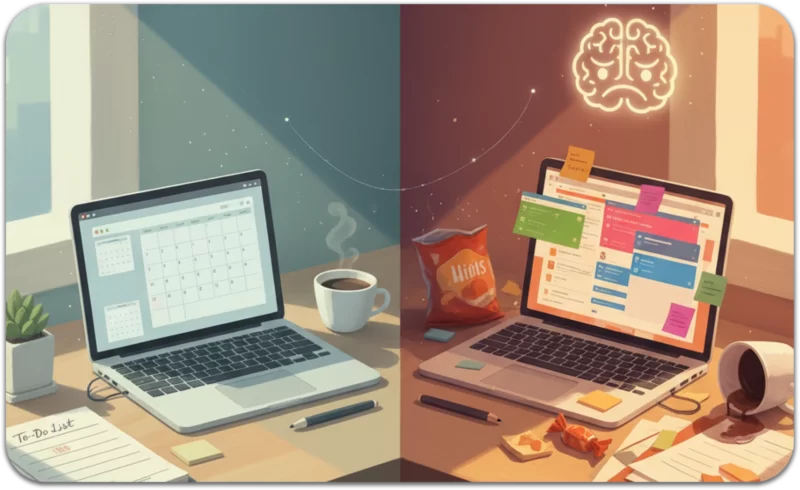
In our hyperconnected, always-on world, it’s become almost trendy to joke about being “bad at adulting.” If you’re struggling to remember to pay bills on time, keep your apartment clean, or be on time despite your best intentions, you might just tell yourself “you’re bad at adulting,” but there could be more to it.
What if these struggles aren’t character flaws or generational quirks? They could be signs of something more significant, like ADHD.
Attention-Deficit/Hyperactivity Disorder (ADHD) affects an estimated 7 million children and 6% of adults in the United States, according to the Centers for Disease Control and Prevention (CDC). Yet, countless adults remain undiagnosed, attributing their daily struggles to personal shortcomings rather than recognizing the signs of a condition that’s both treatable and manageable.
Below, we break down common misconceptions and easy-to-spot signs of ADHD and point you towards solutions. With intentionality and support from medication or therapists, like those from GoodTherapy, you can tackle your ADHD and thrive in your day-to-day life without feeling stifled.
Adult ADHD vs. Childhood ADHD: Key Differences to Know
When most people think of ADHD, they picture a young child bouncing off classroom walls, unable to sit still or focus. This stereotype has done significant damage to public understanding of the condition, particularly for women and adults who don’t fit this narrow profile.
Key Insight: The reality is that ADHD presents differently across individuals, genders, and life stages. While hyperactivity might be the most visible symptom in some children, many people with ADHD are primarily inattentive, appearing spacey, forgetful, or disorganized rather than disruptive.
Women and girls are particularly likely to be overlooked because they often internalize their symptoms. Instead of acting out, they might daydream, struggle with self-esteem, or develop anxiety as a secondary condition. In fact, recent research found that girls with ADHD are significantly more likely to be diagnosed later in life, if at all.
Adult ADHD rarely involves running around a classroom. Instead, it might manifest in much more covert and counterintuitive ways, such as:
Common Adult ADHD Manifestations:
-
Chronic procrastination and difficulty starting tasks
-
Time management challenges and chronic lateness
-
Difficulty maintaining organizational systems
-
Hyperfocus on interesting tasks while neglecting important ones
-
Emotional dysregulation and rejection sensitivity
-
Relationship difficulties due to forgetfulness or inattentiveness
Many adults discover they have ADHD only when their child is diagnosed, or when life demands exceed their coping mechanisms. Major life transitions such as starting college, beginning a career, or having children can overwhelm existing coping strategies and reveal underlying ADHD symptoms.
Understanding the signs of ADHD and challenging common stereotypes can provide you with answers to the questions you might be asking about yourself or your child. It can also encourage healthy conversations around ADHD in the space and encourage individuals to seek professional help for this treatable condition.
Debunking Common ADHD Myths
Despite decades of research, misconceptions about ADHD persist. Let’s address some of the most harmful myths so you can remain knowledgeable, informed, and confident that you might not just be “bad at adulting” but actually dealing with something more:
Myth: “ADHD is caused by bad parenting or lack of discipline.”
Fact: ADHD is a neurodevelopmental disorder with strong genetic components. Brain imaging studies show structural and functional differences in the brains of people with ADHD, particularly in areas responsible for executive function, attention, and impulse control.
Myth: “People with ADHD can’t focus on anything.”
Fact: People with ADHD often experience hyperfocus, which is intense concentration on tasks they find engaging. The challenge lies in directing attention to less stimulating but necessary tasks.
Myth: “ADHD medication turns people into zombies.”
Fact: When properly prescribed and monitored, ADHD medications can help normalize brain function rather than suppress personality. Many people report feeling “more like themselves” when their symptoms are well managed.
Myth: “Everyone has a little ADHD.”
Fact: While everyone occasionally struggles with attention or organization, ADHD symptoms are persistent, pervasive, and significantly impair daily functioning across multiple life domains.
How The Modern Digital Age Worsens Adult ADHD Symptoms
Our modern environment presents unique challenges for people with ADHD. The constant ping of notifications, the pressure to multitask, and the overwhelming amount of information we process daily can exacerbate ADHD symptoms or mask them entirely.
Being aware of the elements that can worsen or actually hide ADHD in yourself or others is key to addressing the condition at its core. Consider these modern stressors:
Information Overload
The average person consumes the equivalent of 174 newspapers’ worth of information daily.
Decision Fatigue
From choosing what to watch on streaming platforms to navigating endless product options online, we make thousands of decisions daily.
Always-On Culture
The expectation of immediate responses to emails, texts, and social media creates constant pressure and interruption.
While it can be hard to avoid an influx of information in our day-to-day, there are strategies for minimizing this overload and avoiding burnout, whether that’s by minimizing doomscrolling, taking breaks from social media, or talking to a licensed therapist from GoodTherapy.
3 Real-Life Adult ADHD Examples: Do Any Sound Familiar?
It’s important to talk with an expert before diagnosing yourself with ADHD. Still, recognizing common symptoms of ADHD is crucial for both recognizing you’re probably not “bad at adulting” and also finding the help you need. Consider these adult ADHD examples:
The Overwhelmed Parent
Parents with ADHD are ones who probably always considered themselves “scattered” but managed well enough until having children. Now, managing schedules, activities, and household responsibilities feels impossible, and they’re constantly forgetting important items, running late, and feeling like they’re failing.
The Underachieving Professional
These adults are intelligent and creative but struggle to complete projects on time. They procrastinate until the last minute, then work frantically to meet deadlines. Despite their talents, they’re viewed as unreliable and may be passed over for promotions.
The Chronic Self-Critic
These individuals have always attributed struggles with organization and time management to laziness or lack of willpower. They’ve likely developed anxiety and depression, never realizing that difficulties might stem from ADHD, rather than not being equipped to be an adult.
Next Steps: How to Get Help for Suspected Adult ADHD
If you recognize yourself in these descriptions, approach the possibility of ADHD with curiosity rather than judgment. Having ADHD is nothing to be afraid of, and it doesn’t mean you’re broken or flawed: it means your brain works differently, and you may benefit from different strategies and support. Take the following next steps to set yourself up for success and discover the sides of ADHD you might not know:
Your ADHD Action Plan
Educate yourself:
Learn about ADHD from reputable sources like the National Institute of Mental Health or CHADD (Children and Adults with Attention-Deficit/Hyperactivity Disorder).
Track your symptoms:
Keep a journal of daily challenges and patterns. Note when you struggle most and what strategies help.
Seek professional evaluation:
A qualified GoodTherapy professional can conduct a comprehensive assessment and help you understand your symptoms in context.
Connect with others:
Online communities and support groups can provide valuable insights and reduce feelings of isolation.
Getting Adult ADHD Support: You Deserve Better Than “Just Trying Harder”
The narrative that you’re just “bad at adulting” is not only unhelpful but also potentially harmful if it prevents you from getting the support you need. Your struggles are real, and you deserve compassion, especially from yourself. Remember, recognizing ADHD is about understanding your brain so you can work with it rather than against it. With proper support, strategies, and sometimes medication, people with ADHD can thrive in all areas of life.
If you’re struggling with symptoms that might be related to ADHD, don’t hesitate to reach out to a mental health professional. Getting answers can be the first step toward a more manageable and fulfilling life where you can complete that to-do list, make decisions, navigate relationships, and more with ease.
The preceding article was solely written by the author named above. Any views and opinions expressed are not necessarily shared by GoodTherapy.org. Questions or concerns about the preceding article can be directed to the author or posted as a comment below.


